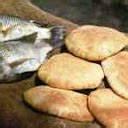Jesus doesn't want to send the crowd away hungry but it returns to the topic of bread that has flowed through the chapter from eating bread without washing to the crumbs of bread for the Canaanite woman.
Matthew 15:34 How many loaves have ye?
Matthew 15:34 How many loaves do you have?
How many loaves do you have?
The question is very simple.
Focus on what you have not what you don't.
How many loaves have ye?
How many loaves do you have?
How many - The Greek adjective translated as "how many" means "[of number] of what quantity," [in distance] "how far," [of time] "how long," [of value] "how much," "how great," "how many," and "how much."
loaves - The word translated as "loaves" means "small loaf or cake of bread." It is more like a slice of bread today. In every part of the chapter, the word translated both as "bread" and "loaves" is the same in Greek. It is more like a slice of bread today. It describes a thin 1/2 inch thick round or an oblong loaf of wheat bread, meant to be torn into pieces and not cut. It was closer to a flour tortilla than a load of bread. "Bread" is one of Christ's most basic symbols, representing temporary physical nourishment as contrasted with permanent spiritual nourishment.
have - The word translated as "have" means "to possess" or "to keep" but it isn't used in the same way as a "helper" verb than the English "have" is. It means to have in you possession or at hand.
ye? - This comes from the second-person, plural form of the previous verb.
How many - The Greek adjective translated as "how many" means "[of number] of what quantity," [in distance] "how far," [of time] "how long," [of value] "how much," "how great," "how many," and "how much."
loaves - The word translated as "loaves" means "small loaf or cake of bread." It is more like a slice of bread today. In every part of the chapter, the word translated both as "bread" and "loaves" is the same in Greek. It is more like a slice of bread today. It describes a thin 1/2 inch thick round or an oblong loaf of wheat bread, meant to be torn into pieces and not cut. It was closer to a flour tortilla than a load of bread. "Bread" is one of Christ's most basic symbols, representing temporary physical nourishment as contrasted with permanent spiritual nourishment.
do -- This helping verb is used to create questions, commands, negative statements, and smooth word flow in English, but the Greek could be either a question or a statement.
you - This comes from the second-person, plural form of the previous verb.
have - The word translated as "have" means "to possess" or "to keep" but it isn't used in the same way as a "helper" verb than the English "have" is. It means to have in you possession or at hand.
Πόσους (adj pl masc acc) "How many" is from posos, which means "of what quantity," [in distance] "how far." [of number] how far," [of time] "how long," [of value] "how much," "how great," "how many," and "how much."
ἄρτους (noun pl masc acc) "Bread" is from artos, which means specifically a "cake of whole wheat bread," and generally "loaf," and "bread."
ἔχετε; (verb 2nd pl pres ind act) "Have" is from echo, which means "to have," "to hold," "to possess," "to keep," "to have charge of," "to maintain," "to hold fast," "to bear," "to keep close," "to keep safe," and "to have means to do."
This question is strange because the quantity doesn't matter.

